- News
- Reviews
- Bikes
- Accessories
- Accessories - misc
- Computer mounts
- Bags
- Bar ends
- Bike bags & cases
- Bottle cages
- Bottles
- Cameras
- Car racks
- Child seats
- Computers
- Glasses
- GPS units
- Helmets
- Lights - front
- Lights - rear
- Lights - sets
- Locks
- Mirrors
- Mudguards
- Racks
- Pumps & CO2 inflators
- Puncture kits
- Reflectives
- Smart watches
- Stands and racks
- Trailers
- Clothing
- Components
- Bar tape & grips
- Bottom brackets
- Brake & gear cables
- Brake & STI levers
- Brake pads & spares
- Brakes
- Cassettes & freewheels
- Chains
- Chainsets & chainrings
- Derailleurs - front
- Derailleurs - rear
- Forks
- Gear levers & shifters
- Groupsets
- Handlebars & extensions
- Headsets
- Hubs
- Inner tubes
- Pedals
- Quick releases & skewers
- Saddles
- Seatposts
- Stems
- Wheels
- Tyres
- Health, fitness and nutrition
- Tools and workshop
- Miscellaneous
- Cross country mountain bikes
- Tubeless valves
- Buyers Guides
- Features
- Forum
- Recommends
- Podcast
news
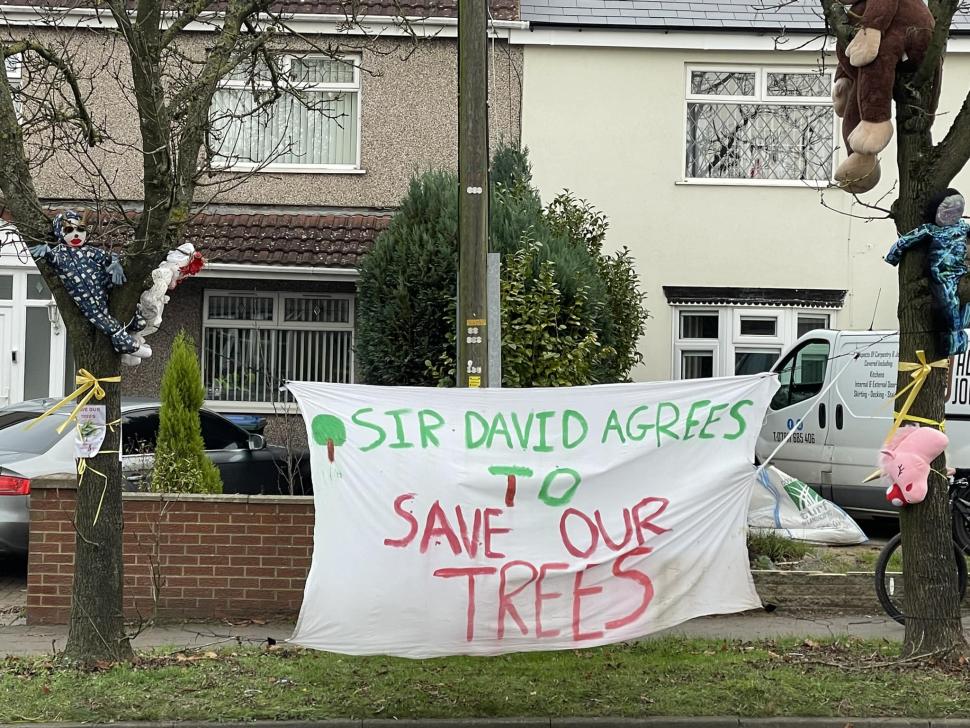 "Sir David agrees to save our trees" banner in Coventry
"Sir David agrees to save our trees" banner in CoventryControversial cycle lane ‘opposed’ by David Attenborough to go ahead after extremely narrow vote – as council says trees at centre of heated row are only being felled as “last resort”
Controversial plans for the final phase of a cycle lane project in Coventry, the subject of months of local outrage, protests, and an unlikely intervention by Sir David Attenborough, are finally set to go ahead – just – after a council committee approved the proposals by five votes to four.
Earlier this week, members of Coventry City Council’s scrutiny co-ordination committee backed the decision made last month by a senior councillor to approve the latest design for a protected two-way cycle lane on Clifford Bridge Road, in the east of the city, after representatives from across the political divide called for “more scrutiny” of the heavily debated scheme.
According to Coventry City Council, the 6km-long protected Binley Cycleway project, which will link the city centre to University Hospital Coventry, was “developed and designed to accommodate the needs of people that do not usually cycle” by reducing concerns about safety and lack of confidence.
The Labour-controlled council said it expects around 200 cyclists a day to use the Clifford Bridge Road portion of the route once it is built, while a report published by the local authority noted that collisions resulting in injury have been reduced on the roads where the previous sections of the cycleway have been installed.
However, despite the council’s ambitions to promote sustainable travel and improve road safety in Coventry, the final phase of the project on Clifford Bridge Road has been the subject of intense scrutiny and criticism from locals in recent months focused, activists say, on both safety and the future of the road’s trees, earmarked to be felled as part of the lane’s construction.
In fact, the council has been forced to redesign the scheme three times, after feedback from locals revealed opposition to reduced parking provisions along the road, the proposed narrowing of lanes for motorists, and the potential danger for drivers “reversing blindly” across the bike route, while a second design was opposed by residents and cyclists alike due to safety concerns.
In August, we reported that a petition was launched, reaching around 4,000 signatures, urging the local authority to stop the cycleway scheme “immediately” to save the “irreplaceable” trees on Clifford Bridge Road, despite the council pointing out that, if the plans are approved, the 26 felled trees are set to be replaced by 32 saplings and a range of low growing plants.
The campaign won the rather unexpected backing of Sir David Attenborough, after the veteran broadcaster and environmental campaigner responded to a letter from a Coventry schoolchild, who said it would be a “shame” if the council carried out its plans to cut down the road’s trees, by advising the 11-year-old to contact the Warwickshire Wildlife Trust for suggestions on “how to organise a protest”.
In November, that protest duly took place, as 900 people turned up to voice their opposition to the council’s plans as part of what campaigners described as the UK’s largest tree-hugging event.
Since then, the issue has been mired in controversy, after campaigners accused the council of “spreading misinformation” following comments made on local radio by the local authority’s head of transport and innovation John Seddon. He claimed that the initial cycleway plans were rejected by residents due to fears they would lose car parking spaces on the road, and that many of the 26 trees forming the focal point of the debate are infected with Ash dieback, a highly destructive fungal disease killing the UK’s native common ash species.
“As a society we have to deal with misinformation from media and social groups, we do not expect council officials to mislead the public,” a formal complaint to the council said.
While one campaigner told road.cc that any suggestion that the initial opposition to the cycleway was based on fears surrounding the loss of on-street car parking spaces was a “lie”, Coventry City Council’s Mark O’Connell said that the original parking-based uproar was key to the current compromise design on the table, including the proposed loss of the 26 trees – and claimed that the campaigners were simply intent on stopping the infrastructure at all costs.
“In the first iteration of the scheme, there were some loss of trees involved, but nothing like the 26 we’re talking about now,” O’Connell, the local authority’s head of public realm, told road.cc.
“But as part of that design, there was going to be a loss of parking spaces. We’re talking about on-street car parking, not off-street. And the loss of parking spaces would have been adjacent to or outside properties that have already got private parking – it’s not like you’d have had nowhere to park, it wouldn’t have been like that at all.
“Also, as part of that scheme, the road was going to be narrowed, but leaving it plenty wide for two-way vehicle traffic.
“But there was obviously a lot of uproar, petitions, and public feeling, and those were the two big things that they commented on, that they didn’t really like, so that that scheme was unacceptable, and we got told to go away again.”
He continued: “We’re on the third iteration, and there have been significant changes to the design, to incorporate people’s views. It’s the same things that they’ve got an issue with and it’s things that have already been answered, such as road safety and parking.
“But they're still not happy with it, even though they're actually going to gain parking spaces, and the road is unchanged.”
O’Connell pointed out that recent road safety stats have revealed that only three cyclists have been involved in collisions along completed sections of the Binley Cycleway – two of which featured cyclists not even riding in the protected lane when they were hit by drivers.
And he also noted that the much-vaunted off-road alternate route proposed by opponents to the scheme, through a nearby parkland, would lead to the felling of “a lot more than 26 trees”.
But despite this insistent opposition from campaigners, the latest revised plan was signed off last month by Patricia Hetherton, the cabinet member for city services, who said that the local authority had listened to residents and made changes based on their feedback.
And on Tuesday, a meeting was held after both Labour and Conservative councillors demanded more scrutiny of Hetherton’s ruling, and challenged the plans.
However, Hetherton’s decision was ultimately backed by a majority of the council’s scrutiny co-ordination committee, who approved the scheme by just five votes to four.
Responding to the committee’s approval, council officers stressed that the project will undergo another safety review by an external company before any work is carried out, noting that the road’s 26 trees are only being felled “as a last resort”.
“I’m saddened we’re losing those trees,” Hetherington said after approving the scheme last month.
“If we reduced the width of the highway, we could have saved more trees. But clearly the residents didn't want that, and as a consequence we're having to lose more trees.”
After obtaining a PhD, lecturing, and hosting a history podcast at Queen’s University Belfast, Ryan joined road.cc in December 2021 and since then has kept the site’s readers and listeners informed and enthralled (well at least occasionally) on news, the live blog, and the road.cc Podcast. After boarding a wrong bus at the world championships and ruining a good pair of jeans at the cyclocross, he now serves as road.cc’s senior news writer. Before his foray into cycling journalism, he wallowed in the equally pitiless world of academia, where he wrote a book about Victorian politics and droned on about cycling and bikes to classes of bored students (while taking every chance he could get to talk about cycling in print or on the radio). He can be found riding his bike very slowly around the narrow, scenic country lanes of Co. Down.
Latest Comments
- mdavidford 1 hour 15 min ago
It is generally discouraged, though - the default should be to reverse in if at all possible....
- Global Nomad 2 hours 49 min ago
would be good to see you test the Newmen wheels the weight/price ratio is extremely good and suggests that europeans can match the chinese in this...
- mdavidford 5 hours 8 min ago
I don't think you have. I think their point was:...
- jamesha100 15 hours 3 min ago
Should be a lifetime driving ban. Who could seriously argue against the justice of that in this case?
- thax1 21 hours 50 min ago
Another 'sound-alike' mid tier offer, so I get all excited and buy a bunch of them thinking I've got an absolute steal. Only to then realise I've...
- mdavidford 21 hours 59 min ago
first cast out the beam out of thine own eye
- mark1a 23 hours 22 min ago
New addition to the fleet, a Specialized Aethos. This is the Comp model, 12 speed 105 Di2, 10r carbon layup in pearlescent white, with upgraded...
- hawkinspeter 1 day 30 min ago
Local 'nimbyism' dismissed as consensus is new scheme will 'increase footfall'...
- Secret_squirrel 1 day 4 hours ago
Yes. Just like there's no push rod brakes or U brakes any more. Get with the program granddad.
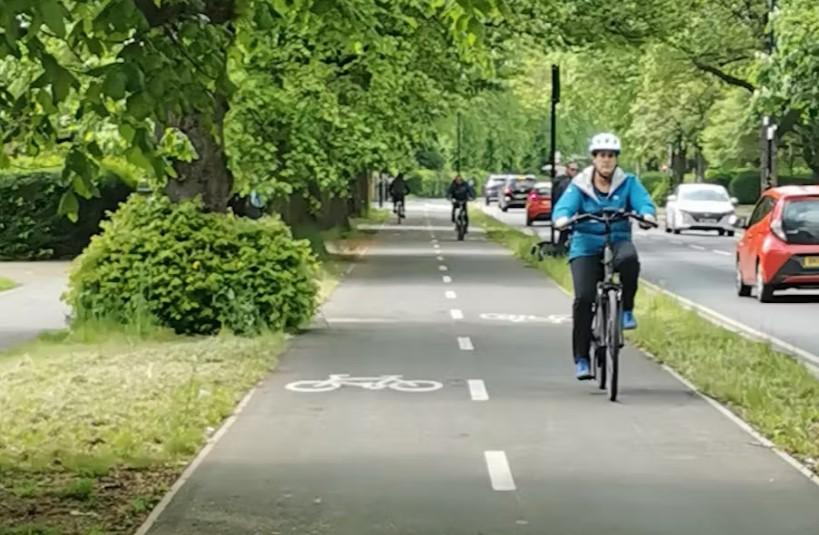
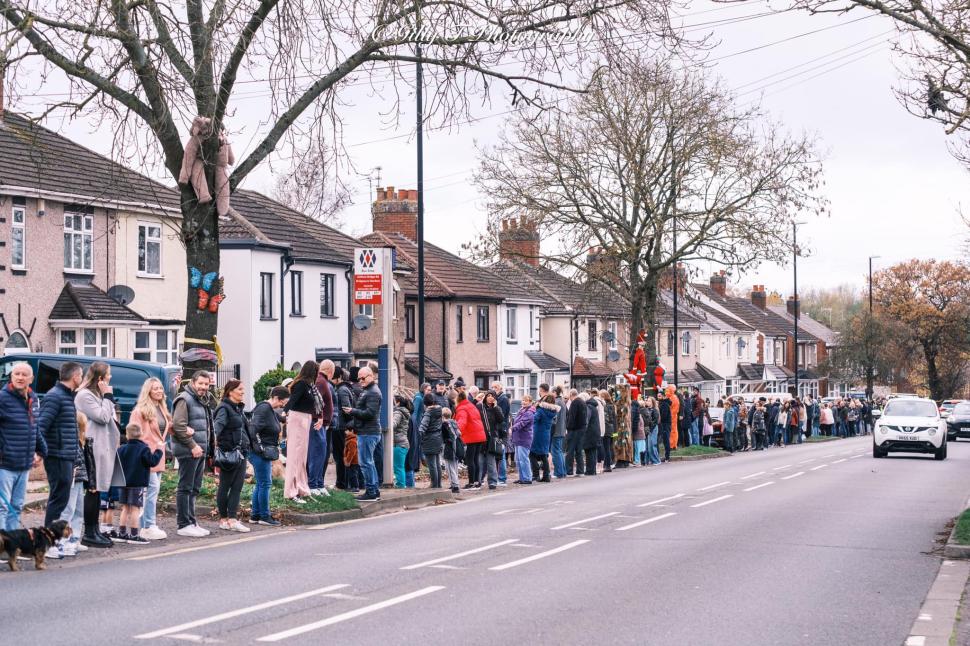
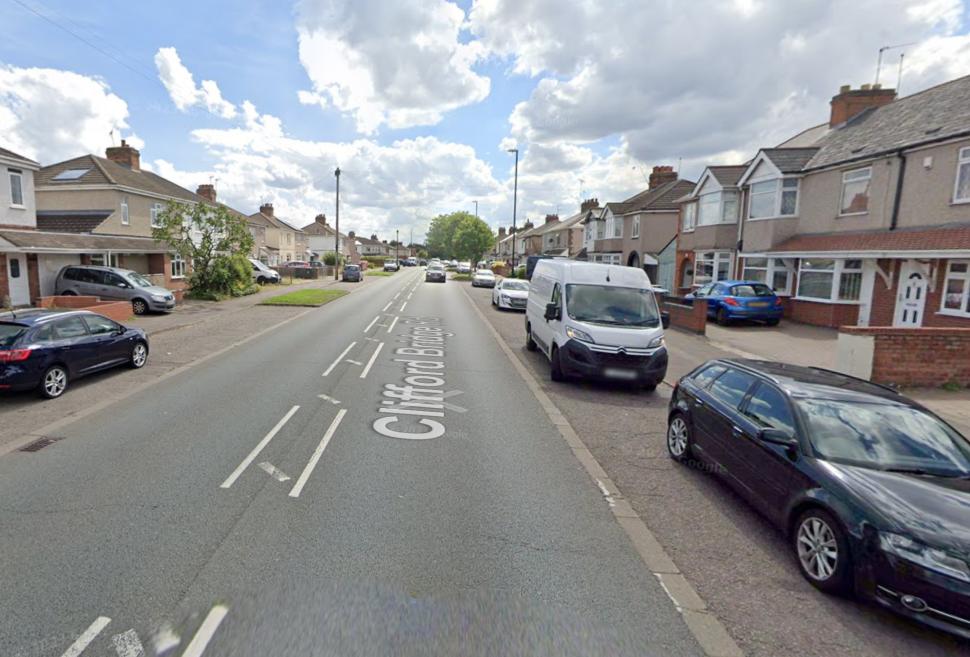
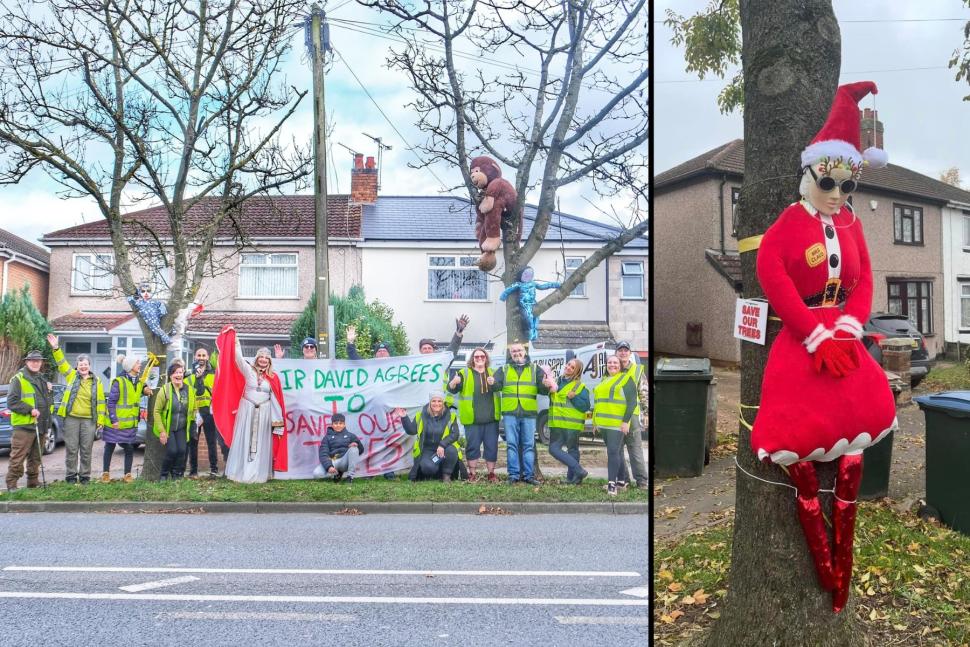
Add new comment
12 comments
If you want to see a real demonstration, albeit on social media from kick ball fans, tell them you are keeping the trees but making the road a single lane to make room for the cycle ways. Tin helmet time.
Looking on Google Street View, nearly everyone in this road has a driveway made of concrete that is nearly two car lengths long. The environmental damage caused by that is immense. The quid pro quo would be not to have the cycle lane but to return the driveways to gardens and ban on-street parking. The residents would quickly backtrack.
On another tack, hundreds of trees are being felled countrywide to make way for new roads. No, these are not in these people's back yard, so they don't care.
These 'protests' truly irritate me (putting it politely). Concern about pollution - when they own 1 or usually more cars. Concern about trees - when they have paved, off - street parking which contributes to run - off and flooding. Concern about the environment - when cities, housing, shopping, entire countries are designed for the sole benefit of cars, cars, cars. Concern about safety - when motor vehicles are responsible for the thousands of deaths and injuries each year. Concern about congestion - well, they still can't see that it's not cycle lanes that cause congestion, it's motor vehicles and too many of them.
Don't forget sudden concern about people with visual impairments and disabilities - whenever a cycle path is mooted....
However - the vibe may have shifted. Watch out for a return to "we don't feel as rich - especially with all these extra people here. There seems to be more congestion too. And what about this bad weather? We need to build / pave / drive / drill our way out of this decline. I love the street trees!".
I wonder how many would accept the offer of a tree for their front garden?
Or on "their" parking space...
Thank you for putting "opposed" in quotations; quite clearly Attenborough received a doubtless extremely biased and disingenuous letter from a young person saying that the council were going to cut the trees down without actually explaining any other aspects of the case (including the fact that the council are going to plant more trees than they will be cutting down). Like the proper (though doubtless busy) gentleman he is he sent out a brief reply saying it would be a shame to lose the trees, which is quite a way away from supporting the anti-cycle lane campaigners who are clearly much more exercised about losing their driving "rights" than the trees. I don't suppose it would be possible but it would be interesting to put the whole case to Sir David, including the fact that the trees could be saved if drivers would agree to the road being narrowed, and see his opinion then.
Every time we have a storm in the UK, many trees are blown down, so a few trees removed for a family cycle lane will not make much difference to the tree population.
You lost, get over it. etc.
TBH from what I learned on this issue last outing here (I'm not a local), they really need to sort out the slightly wider road network. Reportedly issues are:
a) Despite a ring road, people are complaining about congestion at access points to the ring road (although that always needs care - we don't want more "predict and provide" and while there is mass motoring there will always be congestion)
b) ... so they're then using local roads and streets to get to places more directly.
c) Hospital on the edge of town which could do with a better connection to said ring road.
After sorting that out this road wouldn't need to be a through-route for motor traffic. (After which point there shouldn't be a lot of motor traffic, what remained could be slowed down, and eventually separate cycle infra might be unnecessary). But ideas like deliberately limiting motor traffic permeability across an urban area are likely far too "Dutch" to bring into discussion in most of the UK just yet...
All those photos of Concerned Locals™ - surely a good moment for local cyclists to ride past, ideally in primary position?
Or two abreast